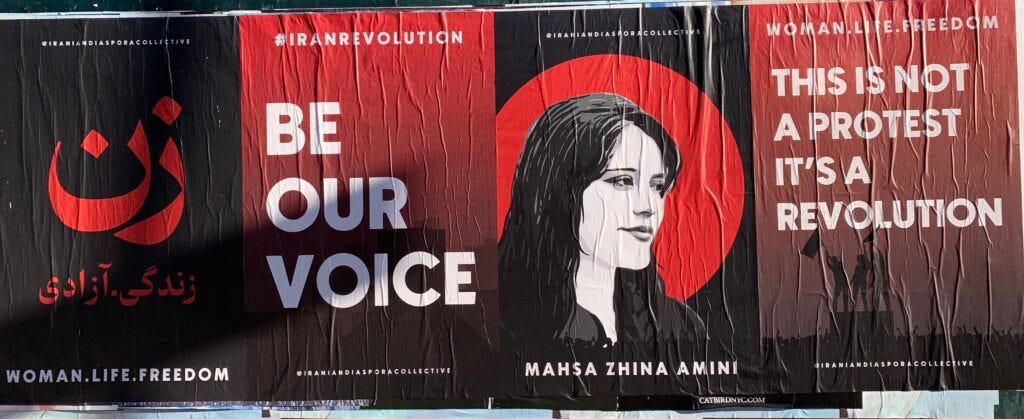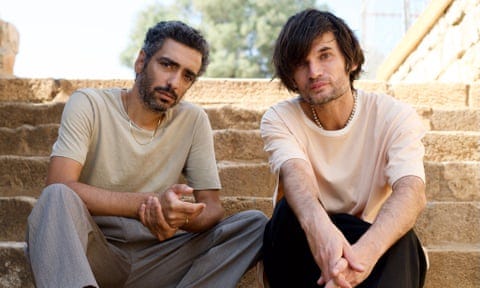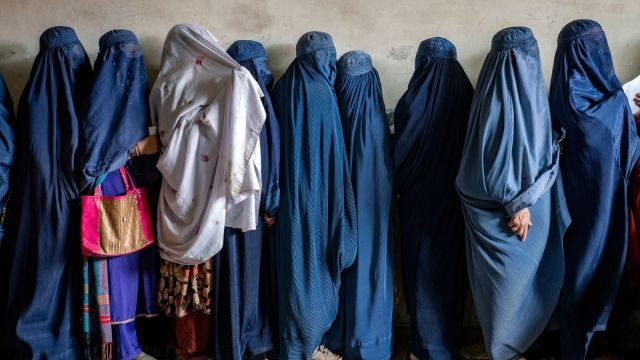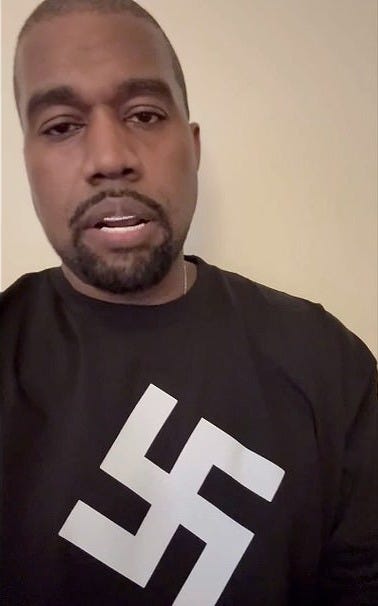Art Is Not a Mirror
A Call to the Global Arts Community to Recommit to Our Sacred Duty of Creating Peace through Music, and the Arts
“Art is not a mirror held up to reality but a hammer with which to shape it.” ― Bertolt Brecht
As I sit here tonight, ten chilling days after Yom HaShoah—the Day of Remembrance for the six million Jews who were systematically murdered during the Holocaust and listening to one of the most inspiring multi-cultural touring acts I have heard in my lifetime, a group of artists who have dedicated their sonic connections to peace, a desperately needed salve in our current climate, I find myself finishing this open letter in a state of numbing grief and sorrow.
The past month has brought a cascade of events—among them, headlines dominated by talentless, grifting acts like Kneecap, who managed to dominate international news following their performance at Coachella, where hate speech was given a global stage. The subsequent glorification and elevation of the act was met with a deafening wave of silence from far too many corners of the music industry. That silence has not only created a moral vacuum, but it has also left a crushing absence of integrity in its wake—an absence that demands resistance.
What has followed in the aftermath of Kneecap’s shameless grifting scheme is a feckless and chilling indifference—a trend that appears to be accelerating. With no voices of leadership or moral clarity emerging from within the industry, the trajectory is deeply troubling. Nearly three weeks have passed since the performance, and yet Coachella’s organizers remain silent.
No apology. No clarification. No condemnation.
The room for plausible deniability is not even up for debate here. Aside from Kneecap’s views being public, Kneecap publicly performed his set the night before and was asked to do it again the following evening. The band Kneecap had more than ample time to spread their hate before he turned around and cried about being a victim of censorship, even though he stole global headlines with his calculated stunts.

Kneecap, a band known for its affiliations with Irish Republicanism and leftist nationalist politics, frequently invokes imagery and language rooted in the history of the IRA and the Irish struggle against British rule. In doing so, the group has tried to draw a symbolic parallel between that legacy and the modern-day Palestinian cause. But this comparison quickly unravels under scrutiny. The IRA, despite its violent history, was ultimately engaged in a territorial and political conflict that led to a negotiated peace. Hezbollah and Hamas, by contrast, are not resistance movements seeking coexistence or self-determination—they are extremist organizations explicitly committed to the destruction of another people, guided by religious fundamentalism and genocidal ideologies. Kneecap’s effort to align himself with these groups not only trivializes the Irish peace process but also dangerously legitimizes movements that reject peace entirely. There is no shared lineage here—only the illusion of solidarity built on slogans rather than substance.
Given Kneecap’s public support of designated terrorists, it is unconscionable that Coachella’s leadership not only allowed them to perform, but there has been no official statement from Coachella, a silence so loud, it begs many questions.
But this pattern of silence is not new.
We saw it after October 7th, when nearly 400 people were murdered, raped, and kidnapped at the NOVA music festival—a peace gathering, deeply connected to the global dance and arts community. Many of NOVA’s attendees were not only part of the international festival scene but were also longstanding members of the Burning Man community. In fact, some of the NOVA organizers and participants also run “Midburn,” the official Burning Man regional event in Israel and the only sanctioned Burn in the Middle East, which was scheduled to occur a few weeks after October 7th, 2023.
And yet it took Burning Man leadership nearly three full weeks to issue a public response to the massacre. When they finally did, it was an Instagram post and the statement was a milquetoast attempt at neutrality, failing to acknowledge the scale or intent of the atrocity. It was as if the lives of their own community members—raped, murdered, and dragged into Gaza—did not warrant a clear moral stance.
This wasn’t just silence. It was abandonment.
If communities built on radical inclusion, peace, and artistic freedom cannot speak up when their own are slaughtered, what hope is there for accountability in the broader cultural landscape?
Sayyed Hassan Nasrallah and the Irrevocable Nature of Stochastic Terrorism
If you are unfamiliar with Sayyed Hassan Nasrallah, the Secretary General of Hezbollah, he adheres to a radical Shi’a Islamist ideology rooted in the teachings of Ayatollah Ruhollah Khomeini, the founder of the Islamic Republic of Iran. Iran’s ruling regime, led by the IRGC (Islamic Revolutionary Guard Corps), is known for brutally repressing women and girls—forbidding them from singing, dancing, or even showing their hair. Hezbollah functions as a proxy of the IRGC and takes direct orders from them.
“We are the sons of the Imam Khomeini… We are his soldiers.” – Hassan Nasrallah
Sayyed Hassan Nasrallah’s worldview is shaped by velayat-e faqih (guardianship of the Islamic jurist), a doctrine that asserts that a Shi’a cleric should rule over society. He and his cohorts believe that they have the divine right to rule over the whole world.
“Our plan, to which we, as faithful believers, have no alternative, is to establish an Islamic state under the rule of Islam.”
—Hassan Nasrallah, 1989 (quoted in Middle East Quarterly)
It is also worth noting that the band’s name, “Kneecap,” is most certainly a nod to the barbaric practice used by terrorists in the IRA known as Kneecapping—the act of shooting “dissidents” or “political enemies” in the knees. In many cases, the so-called political crime was nothing more than fraternizing with British soldiers. Similarly, the name evokes a chilling parallel to a practice currently carried out by Hamas against its political dissidents, who are often children or civilians simply trying to gain access to humanitarian aid that was sent by the world to be given freely—aid that Hamas steals, yet the world continues to falsely blame Israel for.
It should seem obvious, then, that for an artist who claims to care about the children of Gaza, choosing a name that references a violent tactic used against those very children by Hamas is not only hypocritical—it’s grotesque. Hamas’ brutal rule over the Strip has caused enormous suffering to the people of Gaza, and invoking a word that reflects the silencing of political dissidents in the Gaza Strip, including vulnerable civilians and minors, should undermine any claim to humanitarian values.
Given this context, and the band Kneecap’s glorification of Sayyed Hassan Nasrallah—a man whose ideological leadership has been directly tied to the deaths of thousands, including over 1,200 civilians during the 2006 Lebanon War, the bombing of a Jewish center in Argentina that killed 85, the Burgas bus bombing in Bulgaria, and tens of thousands more through Hezbollah’s brutal campaign in the Syrian Civil War—I welcome anyone to explain to me why this ideology of mass murder, terror, and hate, (did I forget to mention talentlessness), is more deserving of the world’s stage than musicians who collaborate with multicultural bands from across the Middle East and who promote peace.
‘This cancellation will be hailed as a victory by the campaigners behind it, but we see nothing to celebrate’
For those who haven’t fully digested the headlines from the past few days: two concerts in England, featuring the guitarist from Radiohead, Jonny Greenwood, part of a touring act promoting peace, were canceled due to credible threats of violence, all for the ‘crime’ of having an Israeli on the ticket.
In an open letter, the band wrote:
“The record we are touring features singers from Syria, Lebanon, Kuwait, and Iraq. The group's ancestral and musical roots are centuries old: in Iraq, Yemen, Syria, Turkey, and all across the Middle East - each of the members brought together by a shared love of Arabic song, regardless of where exactly they all happened to be born. The silencing campaign has demanded that the venues “reaffirm (their) commitment to ethical, inclusive cultural programming." Just not this particular mix of cultures, apparently.
We believe art exists above and beyond politics; that art that seeks to establish the common identity of musicians across borders in the Middle East should be encouraged, not decried; and that artists should be free to express themselves regardless of their citizenship or their religion - and certainly regardless of the decisions made by their governments.” - Jonny Greenwood, Dudu Tassa And the musicians
It is difficult to reconcile the reality that an artist from one of my all-time favorite bands—Radiohead—is being cancelled for promoting peace through music, while bands like Kneecap, who glorify violence and terrorist ideology, are being elevated on the world stage. Dudu Tassa’s history is deeply rooted in cultural bridge-building; he is an ally to peace whose work brings together Jewish and Arab musicians in shared expression. How can the “Free Palestine” movement claim to stand for peace when it actively silences the voices of non-violent peace builders? These intimidation tactics are not isolated to the music industry. Palestinians like Ahmed Fouad Alkhatib and Hamza Howdy, who have grown up in the Gaza Strip and advocate for peace, are regularly intimidated as well.
These incidents are not exceptions—they are the core of the movement. This week, I saw headlines reporting that over 70 former artists of Eurovision signed a letter calling for the cancellation of the competition’s only Israeli participant, not for anything she said or did, but simply for being Jewish. Worse still, she is a survivor of the NOVA massacre, the deadliest mass killing of Jewish people since the Holocaust, and the worst recorded massacre at a music concert in history.
PACBI, BDS, and the Cultural War on Jews
These recent headlines represent only a fraction of the broader campaign led by The Palestinian Campaign for the Academic and Cultural Boycott of Israel (PACBI), a key arm of the Boycott, Divestment and Sanctions (BDS) organization. Founded in Ramallah, PACBI has been orchestrating cultural boycotts for over a decade and is behind the 2009 campaign to cancel a Leonard Cohen concert in Tel Aviv—a campaign that marked one of its earliest high-profile successes in targeting Jewish artists.
Both PACBI and the broader BDS movement have well-documented ideological and personnel ties to terrorist organizations such as Hamas and the Popular Front for the Liberation of Palestine (PFLP). These same groups have also played a central role in organizing anti-Israel campus encampments across the United States and the World.
Even more disturbing, the group behind the cancellation of Dudu Tassa & Jonny Greenwood’s shows is the same ideological network that is attempting to cancel Eurovision contestant Yuval Raphael, and has also called for a boycott of Disney’s Snow White film due to its Israeli star, Gal Gadot—a woman being targeted not for her politics, but for her nationality and Jewish identity.
American Jewish artist Matisyahu is among those who have had performances canceled due to security threats—despite not being Israeli. This kind of harassment and intimidation targeting Jewish and pro-Israel musicians who advocate for peace has been happening for years, long before the most recent war. The BDS network has routinely pursued pressure campaigns to intimidate and silence artists performing in or associated with Israel, often using coordinated online abuse, public blacklists, and venue threats to achieve their goals.
Are you seeing the pattern yet?
These artists are not being censored for their actions or statements. They are being targeted for being Israeli, and in many cases, simply for being Jewish. They are being targeted by an international network operating on behalf of extremist hardliners—groups based in a region whose ruling parties explicitly seek the destruction of the world’s only Jewish state.
These are not civil rights activists. They are hardliners who, in their own words…
“Definitely, most definitely we oppose a Jewish state in any part of Palestine. No Palestinian, rational Palestinian, not a sell-out Palestinian, will ever accept a Jewish state in Palestine.”
— Co-Founder PACBI - Omar Barghouti, May 26, 2014
As artists, we must resist any effort to force us into a political position, especially when we choose not to take a public stance—a right every person should have. These campaigns have targeted artists across the spectrum, for over a decade, including Radiohead, Nick Cave, Lana Del Rey, Lorde, Grammy-nominated independent artists, and many others. Now, these campaigns have escalated into censoring and canceling live shows through threats, coercion, and intimidation in the West.
Does anyone truly believe that these campaigns will simply stop there? History has taught us otherwise. When extremists are rewarded for silencing others, they do not retreat—they expand. What begins with canceled concerts and blacklists quickly metastasizes into a broader cultural purge, where silence is demanded and art is weaponized.
We’ve seen this before.
In the years leading up to the Holocaust, Jewish musicians, composers, writers, and intellectuals were systematically erased from European cultural life. Nazis banned the works of Mendelssohn and Mahler, dismissed Jewish conductors and scholars, and prohibited performances by or about Jews. What began as exclusion became erasure—and ultimately, genocide.
But the roots of this tactic reach even further back—and far beyond Europe.
Long before the modern Boycott, Divestment, and Sanctions (BDS) movement, Arab leaders launched boycotts targeting Jews in the land of Israel, then called Palestine, under Ottoman and British control. As early as the early 1900s, Arab leaders called for the economic isolation of Jews who supported the idea of a modern Jewish homeland. These calls intensified under British rule, particularly after the Balfour Declaration, and gained traction with figures like the Grand Mufti of Jerusalem, Haj Amin al-Husseini—a known collaborator with Nazi Germany, who modeled his anti-Jewish boycotts after the Nazis’ boycott of Jewish businesses.
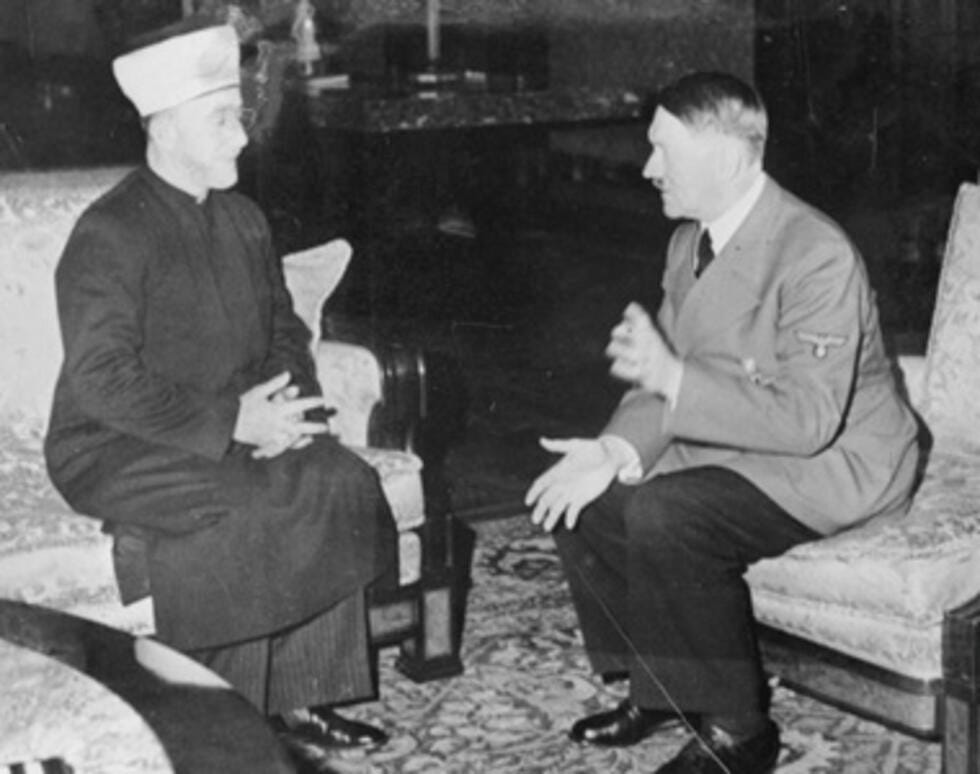
In the wake of World War II, the newly formed Arab League launched a sweeping economic boycott against the Jewish population of Palestine—even before the State of Israel was officially founded in 1948. This wasn’t simply political resistance—it was a continuation of a campaign aimed at denying Jews a place in the region economically, culturally, and existentially.
The modern BDS movement has revived and rebranded this effort, dressing it in the language of social justice while targeting artists, musicians, and academics for the crime of being Israeli—or worse, simply Jewish. The same ideological thread runs from the Arab League’s blacklist of Jewish-owned companies to the cancellation of concerts, film appearances, and artistic collaborations today.
The language used then is chillingly similar to what we hear now: accusations of impurity, disloyalty, and collaboration with a so-called oppressor. Today, it takes the form of public blacklists, venue cancellations, social media harassment, and mass intimidation campaigns. The goals haven’t changed—they’ve just modernized their methods.
We must understand these campaigns for what they are: not activism, but ideological purges. Not protest, but intimidation. If we do not draw the line now—if we do not defend artistic freedom, cultural plurality, and basic human dignity—then the line will soon be drawn for us. And as history has shown, it won’t end with music. It never does.
It Always Starts with The Jews but Never Ends with The Jews - Unknown
Does any of this sit well with you?
I mean that in all sincerity. I find it to be no coincidence that the regimes behind these intimidation campaigns are the very ones who ban music and dancing, and pass oppressive laws where women who dare to sing or move freely are strictly prohibited, and can be tortured, and murdered for doing so. A form of apartheid based on gender, a term we’ve all come to recognize.
These are not mere artistic disagreements. They are authoritarian ideologies that view joy, freedom, and artistic expression as threats. And now, they are creeping into the very spaces we once believed were safe—third spaces that are becoming increasingly rare.
When I first began writing this article over a year ago, I struggled to find the words to convey the magnitude of the attacks on music and the arts from what I saw on October 7th. To me, the attack on NOVA was no coincidence, but from my position at that time, the information I was receiving about local “activism” in the West felt like a grassroots movement, yet over the past year, after quietly collecting story after story of Jewish artists and activists being cancelled, it is a reality I think few can deny.
For those who are still with me, dear readers, it has shocked even me, especially in light of the historical patterns that I have studied and what has particularly emerged in the last month.
Public “blacklists” of artists for being ‘Zionists’ have been circulating all over the internet since October 7th, 2023 for acts as simple as wearing a hostage pin or following content online that is favorable to Israel. Lists that target authors, musicians, actors, playwrights, movie theaters, and anyone who is in the arts for their Jewish identities, or if they are favorable to the Jewish people in any fashion.
When seeing all these efforts compiled together, the reality becomes impossible to deny: this is a highly coordinated, ideologically driven harassment campaign, likely driven by nation-state actors, who are using musicians, artists, and cultural influencers as tools to spread intimidation, misinformation, and influence.
As a longtime admirer of Shostakovich and his music, a Russian composer who endured Stalin’s brutal crackdown on composers, I was profoundly shaped by his story. In my late teens, I was gifted a book of his memoirs, and it sparked a lifelong obsession with authoritarian regimes and their manipulation of music and art, whether to suppress it or to control it, having even written a thesis on the subject while earning my last degree.
Stalin’s 30-year rule saw at least 68 composers exiled to Siberia, and countless others—virtuosos, popular performers, even second violinists—erased from cultural memory when archives were destroyed and paper trails vanished. These artists weren’t simply silenced—they were systematically obliterated, their contributions buried to ensure that only state-approved art remained.
That history has haunted me my entire life, even more so in recent times.
Our Collective Language and How Silence Has Allowed Hate to Find a Stage
“The road to Auschwitz was built by hate but paved with indifference.”
― Ian Kershaw
Words are not neutral—they hold the inherent power to cut or mend, incite or awaken, destroy or build. Every word spoken on a stage, chanted in a crowd, or posted online is a choice: to harm or to heal. Words are immensely powerful tools of the human experience, made even more potent when fused with music and art and the thrill of an audience.
History is rife with examples of how our words, music, and art have started wars, ended wars, toppled corrupt and oppressive regimes, and inspired peace - all without firing a single bullet.
It is our duty as musicians and artists to be responsible stewards of third spaces. Yet we are increasingly living in a time where artists like Kneecap, Kanye West, and Macklemore openly glorify violence and bigotry against those they hate—the Jewish people. Just this week, Kanye West, now a self-professed Nazi released a song this week called “Heil Hitler” with controversial lyrics like, “n***as be actin like f****ts so much, I think they might be Drake… they don’t understand the things I say on Twitter… all my n****s Nazis n***a Heil Hitler…”
Let me point out the obvious truth here: the genocidal ideologies of Hezbollah, Hamas, and their ideological allies are not obscure or veiled. They are publicly stated, deeply rooted, and echoed by movements that claim to stand for justice, but in fact, stand for erasure.
These are just a few of their statements:
“If the Jews all gather in Israel, it will save us the trouble of going after them worldwide.” – Hassan Nasrallah (2002)
“We recognize no treaty with it (Israel), no ceasefire, and no peace agreements.” - Hassan Nasrallah - The Hizballah Program 1988
The Day of Judgment will not come until Muslims fight the Jews and kill them; until the Jew hides behind rocks and trees, which will cry: O Muslim! There is a Jew hiding behind me—come and kill him. - Hamas Charter
These are not fringe voices. These are guiding ideologies for groups with real power, real weapons, and real influence—not just in the Middle East, but increasingly, through Western cultural channels.
And now, these voices are finding new platforms through groups like the Boycott, Divestment, and Sanctions (BDS) movement, and its cultural arm, PACBI—the Palestinian Campaign for the Academic and Cultural Boycott of Israel.
While PACBI often wraps itself in the language of human rights, its founding principles reject Israel’s existence in any form. PACBI co-founder Omar Barghouti has stated plainly:
“Definitely, most definitely we oppose a Jewish state in any part of Palestine.”
—Omar Barghouti, co-founder of PACBI
That is not a statement against policy or occupation—it is a statement against existence. It is a political position that shares ideological ground with Hamas and Hezbollah, even if it uses the rhetoric of activism rather than overt terrorism.
And yet, on global stages like Coachella, we now watch as artists like the rapper from Kneecap scream slogans like “Fuck Israel” and on lesser known stages, chant “Up Hamas, Up Hezbollah” while draped in the Hezbollah flag—not in a back alley, not in a secret meeting, but on stage, cheered on by thousands.
“The aestheticization of politics is the essence of fascism.”
— Walter Benjamin, “The Work of Art in the Age of Mechanical Reproduction” (1936)
From Sanctuary to Surrender: The Cultural Cost of Cowardice
Let me say this plainly: Jews make up only 0.2% of the global population—just 15.7 million people. There are fewer Jews alive today than before the Holocaust. And yet this ultra-minority, historically persecuted, is being vilified again—this time by those who dare to call themselves humanitarians, progressives, and advocates for peace.
These aren’t calls for peace. They are calls for removal, for cancellation, for dehumanization.
“Art and propaganda are one and the same.” – Joseph Goebbels
The avalanche of hate, combined with a stunning silence from those who should know better, and the onslaught of moral inversions, has created the deeply distorted cultural moment we now find ourselves in—a moment that is not new, but one we’ve been slowly descending into. What we are witnessing is not merely a failure of politics or policy; it is a failure of culture—a breakdown in the very values that once defined artistic spaces as havens for empathy and human connection.
Art has the power to heal. To connect. To liberate. It is one of the most transcendent forms of communication we possess—capable of crossing borders, identities, and ideologies. At its best, it invites us to confront our shared humanity.
Art is not a mirror, and it is not a shield. It is a hammer—and it can be used to build sanctuaries or to shatter what little peace we have left. What has become tragically clear since October 7th is that too many artists, too many cultural institutions, and far too many "leaders" have chosen silence, complicity, or, worse, the side of those who glorify terror.
We are standing in a moment where the weaponization of art is no longer a dystopian metaphor—it is a global reality. Music festivals have become battlegrounds, not for ideas, but for ideologies that excuse rape, murder, and hate speech under the false guise of liberation. The celebration of groups like Kneecap, the cancellation of peace-focused artists like Jonny Greenwood and Dudu Tassa, and the blacklisting of Jewish creatives reflect a cultural crisis that cannot be ignored.
To those who remain silent: history will not be kind to your neutrality.
To those who speak in half-truths and aestheticized slogans: you are not dismantling power, you are reinforcing it with a prettier mask.
To those who still believe in the sacred power of music and art to bring people together, to heal, to elevate humanity rather than divide it—this is your call.
You do not need to be perfect. You do not need to know all the history. But you do need to stand up. You do need to speak out. Not just for Jews, but for anyone who believes in dignity, truth, and the sanctity of free expression.
The stage is already set. What we allow on it will determine who we become.
Point your art toward light.
Speak now. Or lose the right to speak later.
Let the hammer build, not destroy.
Let the silence end here.
References
Aish.com. (n.d.). Cancelling Jews in the arts. Retrieved from https://aish.com/cancelling-jews-in-the-arts/
CNN. (2025, May 4). Hamas executions in Gaza over food shortages. Retrieved from https://amp.cnn.com/cnn/2025/05/04/middleeast/hamas-executions-gaza-food-intl
BDS Movement. (n.d.). Supporting student-led solidarity mobilizations in their demands. Retrieved from https://bdsmovement.net/Supporting-Student-Led-Solidarity-Mobilizations-In-Their-Demands
Google Docs. (n.d.). Untitled document. Retrieved from https://docs.google.com/document/d/15SQ_XdrTFVgUGkdn6WvsFQVTFrqrDAzmMDxQsgokCIY/mobilebasic
Roger Williams University. (n.d.). RWU Law Review. Retrieved from https://docs.rwu.edu/cgi/viewcontent.cgi?article=1617&context=rwu_LR
Midburn. (n.d.). Midburn official website. Retrieved from https://en.midburn.org/
Wikipedia. (n.d.). 2012 Burgas bus bombing. Retrieved from https://en.wikipedia.org/wiki/2012_Burgas_bus_bombing
Wikipedia. (n.d.). AMIA bombing. Retrieved from https://en.wikipedia.org/wiki/AMIA_bombing
Wikipedia. (n.d.). Ahmed Fouad Alkhatib. Retrieved from https://en.wikipedia.org/wiki/Ahmed_Fouad_Alkhatib
Wikipedia. (n.d.). Arab League. Retrieved from https://en.wikipedia.org/wiki/Arab_League
Wikipedia. (n.d.). Arab League boycott of Israel. Retrieved from https://en.wikipedia.org/wiki/Arab_League_boycott_of_Israel
Wikipedia. (n.d.). Boycott, Divestment and Sanctions. Retrieved from https://en.wikipedia.org/wiki/Boycott,_Divestment_and_Sanctions
Wikipedia. (n.d.). Casualties of the 2006 Lebanon War. Retrieved from https://en.wikipedia.org/wiki/Casualties_of_the_2006_Lebanon_War
Wikipedia. (n.d.). Censorship in Nazi Germany. Retrieved from https://en.wikipedia.org/wiki/Censorship_in_Nazi_Germany
Wikipedia. (n.d.). Dmitri Shostakovich. Retrieved from https://en.wikipedia.org/wiki/Dmitri_Shostakovich
Wikipedia. (n.d.). Islamic Revolutionary Guard Corps. Retrieved from https://en.wikipedia.org/wiki/Islamic_Revolutionary_Guard_Corps
Wikipedia. (n.d.). Israel in the Eurovision Song Contest 2024. Retrieved from https://en.wikipedia.org/wiki/Israel_in_the_Eurovision_Song_Contest_2024
Wikipedia. (n.d.). Kneecapping. Retrieved from https://en.wikipedia.org/wiki/Kneecapping
Wikipedia. (n.d.). Palestinian Campaign for the Academic and Cultural Boycott of Israel. Retrieved from https://en.wikipedia.org/wiki/Palestinian_Campaign_for_the_Academic_and_Cultural_Boycott_of_Israel
Wikipedia. (n.d.). Popular Front for the Liberation of Palestine. Retrieved from https://en.wikipedia.org/wiki/Popular_Front_for_the_Liberation_of_Palestine
Wikipedia. (n.d.). Syrian civil war. Retrieved from https://en.wikipedia.org/wiki/Syrian_civil_war
United States Holocaust Memorial Museum. (n.d.). Hajj Amin al-Husayni: Wartime propagandist. Retrieved from https://encyclopedia.ushmm.org/content/en/article/hajj-amin-al-husayni-wartime-propagandist
Radio Prague International. (n.d.). The soundtrack of the Velvet Revolution. Retrieved from https://english.radio.cz/soundtrack-velvet-revolution-8541640
Federation of American Scientists. (n.d.). Hizbullah letter. Retrieved from https://irp.fas.org/world/para/docs/880818.htm
Jewish Insider. (2024, March). Jewish Israeli artists face boycotts and threats at U.S. shows. Retrieved from https://jewishinsider.com/2024/03/jewish-israeli-artists-boycotts-threats-u-s-shows-matisyahu/
Columbia University Libraries. (n.d.). Music, politics, and memory: Reflections on the censorship of art. Retrieved from https://journals.library.columbia.edu/index.php/currentmusicology/article/view/5081
National Post. (n.d.). Ontario universities take principled stand against BDS. Retrieved from https://nationalpost.com/opinion/ontario-universities-take-principled-stand-against-bds
United States Holocaust Memorial Museum. (n.d.). Propaganda film: Triumph of the Will. Retrieved from https://perspectives.ushmm.org/item/propaganda-film-triumph-of-the-will
Google Play. (n.d.). Supernova: The music festival massacre. Retrieved from https://play.google.com/store/movies/details/Supernova_The_Music_Festival_Massacre
MIT Press Reader. (n.d.). Leonard Cohen and the concert that never was. Retrieved from https://thereader.mitpress.mit.edu/leonard-cohen-and-the-concert-that-never-was/
International Institute for Counter-Terrorism. (2006, August 21). Hizbullah letter. Retrieved from https://web.archive.org/web/20060821215729/http:/www.ict.org.il/Articles/Hiz_letter.htm
Amnesty International. (2009). Iran: Human rights abuses against women. Retrieved from https://www.amnesty.org/en/wp-content/uploads/2021/07/mde210022009en.pdf
BBC News. (n.d.). Kneecap rapper screams ‘Up Hamas, up Hezbollah’ while draped in assault rifle flag. Retrieved from https://www.bbc.com/news/articles/cly5r4gg7l6o
Encyclopedia Britannica. (n.d.). Velayat-e faqih. Retrieved from https://www.britannica.com/topic/velayat-e-faqih
CBS News Chicago. (n.d.). Chicago Matisyahu concert canceled after threat of protest. Retrieved from https://www.cbsnews.com/chicago/news/chicago-matisyahu-concert-canceled-threat-protest/
Congressional Research Service. (n.d.). Iran’s foreign and defense policies. Retrieved from https://www.congress.gov/crs-product/IF11646
Center for Strategic and International Studies. (n.d.). War by proxy: Iran’s growing footprint in the Middle East. Retrieved from https://www.csis.org/analysis/war-proxy-irans-growing-footprint-middle-east
Office of the Director of National Intelligence. (2024). Statement from Director of National Intelligence Avril Haines on recent Iranian influence efforts. Retrieved from https://www.dni.gov/index.php/newsroom/press-releases/press-releases-2024/3842-statement-from-director-of-national-intelligence-avril-haines-on-recent-iranian-influence-efforts
Deutsche Welle. (n.d.). Vietnam War: How protest music fueled a movement. Retrieved from https://www.dw.com/en/vietnam-war-how-protest-music-fueled-a-movement/a-72321527
Euronews. (2022, May 26). What happens when a country criminalises music?. Retrieved from https://www.euronews.com/culture/2022/05/26/what-happens-when-a-country-criminalises-music
Euronews. (2025, May 6). Former Eurovision contestants call for Israel and broadcaster KAN to be banned. Retrieved from https://www.euronews.com/culture/2025/05/06/former-eurovision-contestants-call-for-israel-and-broadcaster-kan-to-be-banned
Goodreads. (n.d.). Testimony by Dmitri Shostakovich. Retrieved from https://www.goodreads.com/book/show/395617.Testimony
IMDb. (n.d.). Supernova: The music festival massacre. Retrieved from https://www.imdb.com/title/tt31556612/
Willett, J. (Ed. & Trans.). (1964). Brecht on Theatre: The Development of an Aesthetic. New York: Hill and Wang.
(Note: The quote “The task of art is not to reflect reality, but to change it” is widely attributed to Bertolt Brecht, though it does not appear verbatim in his known works. It reflects themes found in this collection, particularly “A Short Organum for the Theatre.”)



